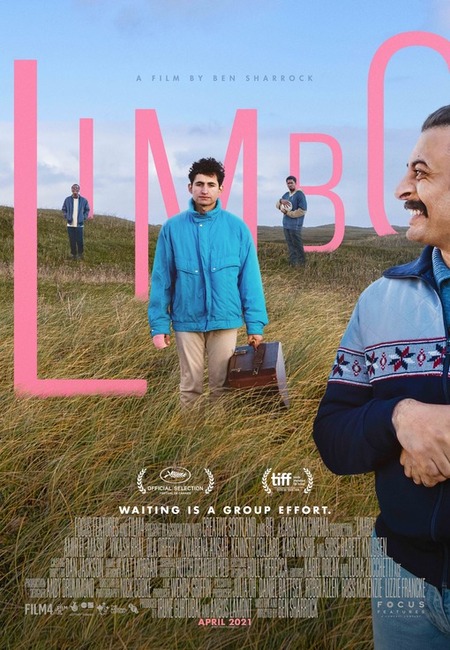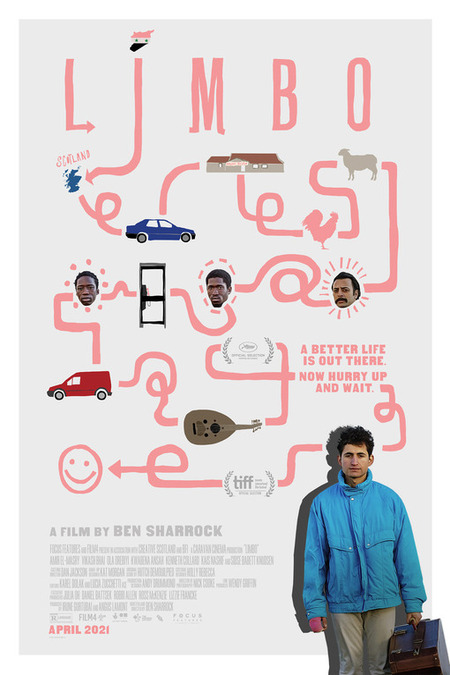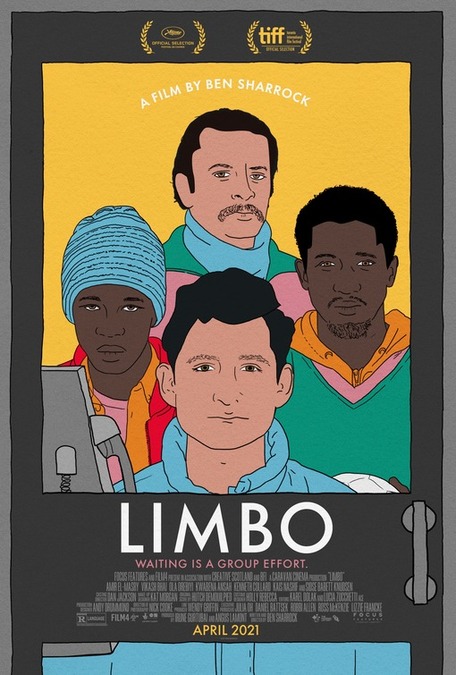Severing someone’s connection to time and place, to the world which makes and sustains them is a catastrophic act that understandable generates a cascading wall of trauma that never really abates, unless, of course, by some compassionately selfless act, they are given the opportunity to reconnect in some other meaningful way in another less poisonously harrowing place.
These truths are self evident for anyone who has witnessed people caught in war, natural disasters or a whole host of other status quo-crushing situations, but we live in a world where far too many people, mostly in the West, safe in their own webs of cosy connectivity, treat this sort of existential dislocation like its nothing.
But as Limbo, written and directed by Scot Ben Sharrock, beautifully and affectingly elucidates, with, it should be noted, not a hint of patronisation or false empathy, it is everything for the people going through it such as Syrian refugee Omar (Amir El-Masry), a gifted Oud player who, along with a small group of other single, male refugees from Africa and the Middle East, is stuck in the titular state on a windswept, rainy, snow Scottish island with little in the way of services, and initially hospitality.
While there is a “Refugees Welcome!” sign strung up enthusiastically by some well-meaning soul on the community centre where Omar and his fellow asylum-waiters, none of them feel particularly embraced by islanders who, while they aren’t outright hostile (save for some thoughtless young people hooning in a car), don’t seem to know what to make of these cultural outsiders, clustered in a small group of homes high on a blustery hill.
Socially cutoff, at least at the start of the film, earning little in the way of money and starved of daily meaning and purpose, save for the arrival of the quirky classical music-playing postman whose driving is a thing of anarchic, inefficient hilarity, Omar and his friends Farhad (Vikash Bhai), Wasef (Ola Orebiyi) and Abedi (Kwabena Ansah) only have one point of structured contact each week – the mandatory classes taught by the gloriously offbeat Helga (Sidse Babett Knudsen) and Boris (Kenneth Collard).
In a film that is often bleaker than its slightly oddball trailer might suggest, these classes, which features cringe-inducing interpretative dance, tone-deaf relatability and a comedic lack of true cultural awareness that the near-hopelessness-enwrapped group accept with an almost silent sense of inevitability, these classes serve a number of purposes.
They underscore how disconnected, except to each other, these fellow refugees are, how cut adrift they are from anything resembling their old lives, and how great a gulf there is to surmount, assuming they are granted the elusive asylum status to do so, to find any sort of home in the country they have sought refuge.
They also lend some necessary humour to Limbo, which beautifully and movingly explores what it is like to be so profoundly ripped apart from everything you’ve ever known and loved and to find yourself stuck in a place so remote and cold that there appears to be no way for anyone to forge a meaningful point of contact.
That they do, in small fleeting ways, matters but by and large, Omar, clutching his Oud case containing the instrument he is too traumatised to play for much of the film, wanders alone across the island in all kinds of weather, his face a blank slate that gives away little of the deeply-etched sadness in his soul.
The only time we see the roiling turmoil behind the bleakly blank facade is when he is on the phone to his mother (mostly) or his father – the only phone is in a booth located, like so much else, out along in a glassy knoll far from anything else (Omar walks far because there’s no choice if you want to reach anything) – and he’s struggling with the fact that his parents are stuck, near-pennyless in Istanbul while his brother, Nabil, who stayed behind to fight in Syria, is unaccounted for.
He grabs things like his mother giving a treasured family recipe like lifelines, and while making it is almost out of the question given how threadbare the supplies are in the island’s only supermarket, the fact that he has it and might be able to make it one day, connects him in some small way to that which he’s lost.
Disconnected as Omar and Farhad, who is unfailingly upbeat mainly because it’s his sole way of keeping his tenuous sanity, are – there’s one heartbreakingly honest scene between the two where pretence is dropped, truth is spoken and we are given precious insight into the various ways people cope with trauma, loss and the flickering flame of hope – Limbo eventually begins to connect them just a little.
A suggested Oud concert here, a moment of community-driven sheep rescuing there and it seems Omar may be on his way to being knitted into something meaningful.
But while those moments of connection definitely matter, Limbo is careful not too glibly and simplistically, and yes, insensitively, suggest that all someone like Omar needs is a few friends and all his troubles are over.
While the ending suggests some healing is in progress, the film’s long, achingly beautiful but melancholically-laced scenes of Omar wandering through snow and tussock, down roads and up hill, oud case always in hand like some magical talismanic connection back to home, convey a sense of disconnectedness that may never be made whole again.
When Omar reminisces about his mother making apricot jam in the spring, or we witness a much-played clip of Omar playing to a large appreciative audience back in Syria – he was a virtuosic talent who time and trauma have rendered mute and insensible – we see the gnawing chasm between the warmth and belonging of the past and the hopeless aloneness of the present and we realise that it’ll take more than a few lovely moments of friendship and community, lovely though they may be, to fix what ails Omar and the others.
The beauty of Limbo is that it doesn’t pretend everything is suddenly rosy through an isolated kind gesture or a moment of reaching out, and while it doesn’t discount their importance since they are the ways in which Omar begins to slowly reconnect in limited form to the world around him (one scene involving him, the Scottish Sikh supermarket owner and a small bag of spice is a gem for its nuanced, emotionally-rich meaning), it knows how bleak hopeless and disconnection can be, and while it is flavoured with quirk and a welcomingly oddball spirit, the film underscores like few films you’ve likely seen, what it’s like to be thrown to the margins, ripped from all you know and have no real control about how you get back.


